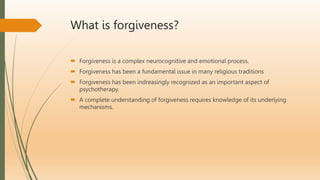
Understanding Forgiveness in Long-Term Relationships
Definition of Forgiveness
Forgiveness in long-term relationships can be defined as the conscious decision to let go of resentment or vengeance toward someone who has caused harm. This act does not mean condoning the hurtful behavior but rather acknowledging it and choosing to move forward without carrying the weight of anger.
Significance of Forgiveness in Relationships
The significance of forgiveness in relationships cannot be overstated. It serves as a fundamental pillar that supports emotional intimacy and connection. Here’s why it’s essential:
- Restores Trust: Being able to forgive strengthens trust and security between partners.
- Promotes Healing: Individuals experience emotional and psychological relief when they choose to forgive.
- Enhances Communication: Forgiveness encourages open dialogue about feelings and hurt, fostering a healthier partnership.
Consider a couple who faced betrayal but decided to work through the pain. Their willingness to forgive not only helped them rebuild their relationship but brought them closer, illustrating how forgiveness facilitates growth in love.

Psychological Impact of Forgiveness
Effects on Mental Health
Forgiveness has profound effects on mental health that are often underestimated. When an individual chooses to forgive, they actively disengage from cycles of anger and resentment. This decision can lead to:
- Reduced Anxiety: Letting go of grudges alleviates the heavy mental burden.
- Decreased Depression: Forgiveness can lift feelings of hopelessness over time.
Consider a friend who once harbored deep resentment toward a partner’s infidelity. By eventually choosing to forgive, not only did they ease their own suffering, but they also improved their mental well-being.
Benefits for the Individual and the Relationship
The benefits of forgiveness extend beyond personal mental health; they significantly enrich relationships as well. Some key advantages include:
- Improved Relationship Satisfaction: Partners who practice forgiveness tend to experience greater satisfaction and connection.
- Enhanced Conflict Resolution: Forgiving reflects a willingness to approach challenges head-on, fostering growth.
This dynamic is beautifully illustrated in couples therapy, where clients show marked improvement in relational health after addressing and forgiving past grievances together.

Factors Influencing Forgiveness
Communication in Forgiveness
Effective communication is a vital factor that influences the process of forgiveness. Open discussions help clarify intentions, express feelings, and define the path toward reconciliation. Here’s how communication plays a role:
- Active Listening: Allowing each partner to share their emotions and grievances creates mutual understanding.
- Expressing Vulnerability: Sharing one’s own feelings of hurt fosters empathy.
For instance, a couple who openly discussed their feelings after a betrayal found that clear communication paved the way for genuine forgiveness.
Role of Empathy and Understanding
Empathy also significantly impacts forgiveness. When partners strive to understand each other’s perspectives, it becomes easier to let go of resentment. Key points include:
- Practicing Compassion: Recognizing that everyone makes mistakes creates space for forgiveness.
- Seeing the Bigger Picture: Understanding the context behind actions leads to more profound empathy.
Imagine a situation where one partner empathizes with the other’s struggles; this shift can facilitate deeper connections, making forgiveness not just possible but a healing journey for both.

Practicing Forgiveness in Long-Term Relationships
Building Trust and Repairing Damaged Relationships
Practicing forgiveness is essential for building trust and repairing any damage that has occurred in a relationship. It involves clear intentions and actions that foster reconciliation. Key steps include:
- Open Dialogue: Regular discussions about feelings and boundaries help rebuild trust.
- Consistency: Demonstrating reliable behavior over time strengthens the belief that forgiveness is genuine.
For example, a couple that faced trust issues after a betrayal found that consistent honesty in their daily interactions gradually restored their sense of security.
Emotional Regulation and Compassion
Another crucial aspect of practicing forgiveness is mastering emotional regulation and demonstrating compassion. This means:
- Managing Emotions: Recognizing one’s feelings and choosing constructive responses.
- Extending Compassion: Understanding a partner’s hardships can soften feelings of resentment.
An individual who learned to regulate their emotions discovered that by approaching their partner with compassion after a conflict, they could engage in meaningful conversations that led to profound healing. This nurturing approach can transform conflict into an opportunity for growth.

Challenges in Forgiveness
Dealing with Resentment and Grudges
Despite the benefits of forgiveness, many face challenges in overcoming resentment and grudges. These feelings can be deeply rooted and hard to release. Some common struggles include:
- Lingering Anger: Past grievances resurface during conflicts, making it difficult to move forward.
- Fear of Vulnerability: Concerns about being hurt again can hinder the process.
For instance, a friend who carried a grudge against a partner found that unresolved feelings often sabotaged their chances of reconnecting, illustrating the weight of lingering resentment.
Managing Hurt and Betrayal
Managing feelings of hurt and betrayal is pivotal in the forgiveness journey. It’s essential to:
- Acknowledge Emotions: Validating feelings of hurt instead of suppressing them is critical.
- Seek Closure: Finding ways to process and talk about the betrayal helps in moving on.
For example, a couple that confronted the pain of betrayal through therapy learned to express their hurt, which was a significant step toward healing. By addressing these challenges directly, individuals can pave the way for authentic forgiveness and deeper connections.

Maintaining Forgiveness for Long-Term Relationship Success
Continual Forgiveness and Growth
To ensure lasting relationship success, practicing continual forgiveness becomes essential. This ongoing process allows partners to grow together by:
- Learning from Mistakes: Each conflict can be seen as an opportunity for improvement.
- Rountine Check-Ins: Regularly discussing feelings helps address issues before they fester.
For instance, a couple that made it a habit to reflect on their relationship weekly found themselves growing closer, showing how forgiveness fosters personal and mutual development.
Creating a Culture of Forgiveness
Establishing a culture of forgiveness within a relationship enriches the bond. This means:
- Modeling Forgiveness: Showcasing the importance of resolving conflicts empowers partners to embrace forgiveness.
- Encouraging Open Dialogue: Creating spaces where both individuals feel safe expressing their vulnerabilities promotes trust.
A couple who consistently supported each other in forgiving past mistakes discovered that this culture not only strengthened their relationship but also deepened their mutual respect, ensuring a more fulfilling partnership.

Case Studies and Real-Life Examples
Successful Forgiveness Stories
Exploring successful forgiveness stories can provide valuable insights into the healing power of forgiveness. One couple, after experiencing a significant betrayal, chose to embrace vulnerability through honest communication. Key elements included:
- Commitment to Healing: Both partners actively engaged in discussions about their feelings.
- Seeking Professional Help: They sought therapy, which facilitated deeper understanding.
Their determination to forgive not only restored trust but also strengthened their bond, proving that healing is possible through mutual effort.
Lessons Learned from Failed Forgiveness Attempts
In contrast, failed attempts at forgiveness can illuminate what to avoid. A couple that resisted addressing their issues found that resentment built up over time, leading to:
- Lack of Communication: Unspoken feelings created walls rather than bridges.
- Withdrawal: One partner disengaged, feeling unheard, which only deepened the divide.
Their experience underscored the importance of addressing grievances head-on and maintaining open communication to foster a healthier relationship. Learning from both successes and failures can guide couples on their own paths toward forgiveness.

Conclusion: Nurturing Forgiveness for Lasting and Fulfilling Relationships
Importance of Forgiveness in Sustaining Long-Term Bonds
Forgiveness plays a crucial role in sustaining long-term relationships. By allowing partners to move past disagreements and emotional wounds, it creates a pathway for deeper intimacy and connection. Key aspects include:
- Resilient Partnerships: Couples who prioritize forgiveness show adaptability in the face of challenges.
- Emotional Safety: Regularly practicing forgiveness fosters a secure environment where both partners feel valued.
For instance, a relationship built on forgiveness experienced fewer conflicts over time, demonstrating how essential forgiveness is for longevity.
Reflection on Personal Growth through Forgiveness
Moreover, embracing forgiveness nurtures personal growth, helping individuals evolve. Through forgiving others, partners often:
- Enhance Emotional Intelligence: Learning to navigate complex feelings can enrich emotional awareness.
- Cultivate Compassion: Understanding others’ mistakes fosters empathy, not just within the relationship but also in broader contexts.
One partner shared that forgiving their spouse led to significant personal change, increasing their capacity for love and understanding. Ultimately, nurturing forgiveness lays the foundation for lasting, fulfilling relationships that thrive on mutual respect and understanding.
